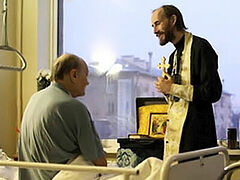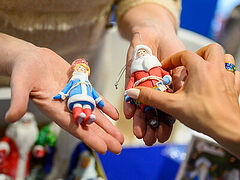Exactly twenty-eight loops are pulled up with a hook to knit tiny woolen socks for an infant weighing no more than one kilogram. Needlewomen knit tiny vests, hats and blankets and donate them to the perinatal centers of the cities of Saratov and Engels, where premature babies are given care. Together with the doctors they fight for the fragile lives of these preemies not only with knitting needles, but also with prayers.
 Needlewomen knit warm clothes with faith, hope and prayer to the Most Holy Theotokos, because they want each baby to live and grow healthy
Needlewomen knit warm clothes with faith, hope and prayer to the Most Holy Theotokos, because they want each baby to live and grow healthy
Warm salvation
The club for knitting enthusiasts and volunteers was called Twenty-Eight Loops. This movement is gaining momentum all over Russia. Now there are such clubs in about sixty regions of Russia, including the Saratov region. Like-minded people have been found in Engels as well. The good cause has united women of different professions and ages: young mothers with many children, many of whom are parishioners of churches of the Pokrovsk Diocese.
The club’s mission is to provide perinatal centers and neonatal pathology departments with knitted products free of charge. You can’t find such clothes in stores, they are too tiny: a hat is the size of a child’s fist, and a sock can only be worn on one finger of an adult’s hand.
Needlewomen don’t knit tiny “wardrobes” and donate them to maternity hospitals just for beauty’s sake. In our medical institutions preemies weighing from 500 grams are given care. Special medical incubators—couvezes—are used for this purpose, but, according to neonatologists, it is not enough.
“You need to continuously maintain the body temperature of a newborn with extremely low body weight and create conditions for him close to those in the womb. Knitted woolen clothes help keep his arms and legs warm and protect his head and fragile body from hypothermia,” explains Larisa Polyakova, the neonatologist of the second department for newborns of the perinatal center of the Engels City Hospital No. 1 and the choir-director of the Church of the Kazan Icon of the Mother of God.
Moreover, 100% pure wool is required for this. Not only does it keep a baby warmer, but it also stimulates nerve endings. Wool causes a slightly tingling sensation, preventing long pauses in breathing that premature babies may have during sleep. So miniature clothing becomes a vital therapy. And for newborns, unusual toys are handknitted from pure cotton—comforters in the form of octopuses. Their spirals resemble the mother’s umbilical cord, and newborns grasp them without pulling wires. The doctor says that they knit all the clothes themselves in the department, and now the club helps them out.
Knitting for the good
 Recently over twenty Engels ladies have joined the charitable project
Recently over twenty Engels ladies have joined the charitable project
Recently over twenty Engels ladies have joined the charitable project. Many of them have never had a preterm birth, but it does not reduce their desire to help. Elena Dondukova, a parishioner of the Church of the Kazan Icon, was the first of the Engels needlewomen to start knitting for babies:
“I saw a post on social media where women were invited to knit. I wrote to the head of the club in Saratov and came to the first meeting at a cafe. They told and showed me everything, and I brought handknitted clothes for the second meeting. And then we decided that we could set up such a club in Engels and not waste time on traveling. A small group was formed quickly, and now we knit with dozens of hands,” Elena says, smiling. “We are doing the same job together and we are glad that our work is useful, and there is feedback. Doctors from the ICU and the neonatology department come to our meetings and thank us for our work. But the main motivation is that these preemies live, grow and make their parents happy.”
Maria Golushko, a mother with many children and a parishioner of the Church of St. Sergius of Radonezh, knits whenever she has a free minute. Three years ago, she had no idea how to pull up loops with a hook.
“I saw information about the club on the parents’ forum, and I immediately became interested in this subject. At first I attended the Saratov club, and then the Engels club,” she relates.
Now Maria can share the secrets of her skills and even invites new volunteers.
“During classes with children at the Sunday school of the church in Engels, the priest’s wife offered to teach knitting to girls from the youth club. In a few lessons they learned the basics, and knitted rugs of a special size made of prickly wool, on which they put preemies—for them it has the effect of massage,” she explains.
Nadezhda Kryuchkova, another parishioner of the church of Engels, learned about the cause while working at the Saratov Palace of Children and Youth’s Creativity. She was asked to send her handknitted toys to the fair, with the funds from which they bought yarn for the club. The good initiative did not leave her indifferent, and she also began to knit for preemies.
Irina Tsaplina, a parishioner of the Holy Trinity Cathedral, has not parted with her knitting needles for two years now. When she heard about the activities of volunteers, she immediately offered her help. She invited them to her private art school and now she knits with them whenever she is free.
“I have always been looking for opportunities to help others, and when at the end of 2019 I heard about Twenty-Eight Loops and that it was hard to find a place for meetings in Engels, I suggested my school as the venue,” Irina recalls.
Here the women’s desire to knit and do good coincided.
“As a rule, people don’t like wearing knitted clothes, and it seems that you’ve done all that work in vain; but here our products help keep a little baby warm. We have a young lady in our group who gave birth prematurely, and she told us how important these clothes are for preemies. So we feel certain that it is vital, and we feel that we are involved in a great work,” the artist says.
The Queen of Heaven helps them
The members of the club meet regularly for a cup of tea—they knit for newborns and share their experience.
“True, we are not doctors and cannot give medical treatment, but with our affection, kindness and clothes knitted with our own hands we are contributing to the recovery of preemies,” the women note.
They knit warm “outfits” with faith, hope and prayer to the Most Holy Theotokos, because they want each baby to live and grow to be a healthy child. And they would not do it without the help of the Heavenly Intercessor of all wives and mothers. It is no coincidence that the Mother of God has been regarded as a quick Helper for many centuries. Offering up prayers to Her for family happiness, children’s health and women’s happiness, the faithful hope to be heard and understood if they turn to Her with sincere repentance and a pure heart.
“When there is trouble in the family or problems with children, you turn to the ‘chosen Leader of triumphant hosts’: ‘Rejoice, O Mother of God and Maiden,’” Elena Dondukova confesses.
“We always feel Her help. I was born on September 21—the feast of the Nativity of the Most Holy Theotokos; and Nadezhda—on October 14, the feast of the Holy Protection. So we are under the Protecting Veil of the Mother of God,” Irina adds.
Maria also shares the story of her child’s miraculous salvation with our readers:
“It was 2013. My husband and I were not church-goers yet. My second pregnancy was complicated, and labor was difficult. The doctors did not give me any hope, except for one doctor who took full responsibility. During childbirth she prayed and sang, ‘O Most Holy Mother of God, save us...’ So Lizonka [a diminutive form of the name Elizaveta.—Trans.] arrived alive and healthy. It strengthened my faith so much that I no longer imagine myself outside the church.” The perinatal center staff often offer up petitions to the Mother of God. The neonatologist Larisa Polyakova has quite a few stories like this.
“In difficult situations parents in despair decide to have their baby baptized. The priest comes, performs the sacrament—and a positive dynamic appears at once,” she recounts. “The Queen of Heaven always helps us, especially in nursing preemies back to health. There are many believers among our staff; before every surgery and birth doctors and obstetricians ask for help from the Lord and His Most Pure Mother. No work is done without the help of God—especially not the birth of a new human being.”
Targeted help
 When discharged from a maternity hospital, every mother is given all the knitted clothes her baby was in in the department for several months
When discharged from a maternity hospital, every mother is given all the knitted clothes her baby was in in the department for several months
Every time volunteers bring up to forty items to the maternity hospital, and in total hundreds of clothes have been knitted over the years.
“The club’s coordinator is assigned to each medical institution. The medical staff inform him about the needs—for example, in one maternity hospital only socks and hats are required; in another—vests and comfort toys. We make up sets and then bring them on a certain day,” Elena explains the mechanism of cooperation.
When discharged from maternity hospitals, mothers are given all the knitted clothes their babies wore in in the department for several months. The miniature “garments” remain with parents as mementos, as symbolic gifts. Seeing and feeling such care and cordiality from unknown people, mothers thank members of the club, and some later come, and themselves knit for young patients.



